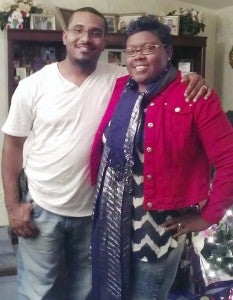Sibling to donate kidney to his sister
Published 12:47 pm Saturday, January 18, 2014
NEWSOMS—Time is beginning to move forward for a Newsoms woman who’s felt stuck – even frozen.

Al Young of Raleigh, N.C., will donate one of his kidneys to his sister, Deanna Hunt of Newsoms. The operation is scheduled for Jan. 28 at MCV in Richmond.
After nearly five years of waiting – and six on dialysis – Deanna Hunt is finally getting a kidney. The source is both close and far away – her brother.
Hunt, 33, said she’s scheduled to receive the organ from Al Young, 24, who lives in Raleigh, N.C.
“I found out he secretly contacted the transplant organization,” she said. “They sent him a test packet and found out he was a match for me. Al called me one day and said, ‘I’m going to be your donor.’”
Hunt wouldn’t believe him at first and the two went back and forth with yeses and nos.
“I didn’t want him to do it. He has his whole life ahead of him,” she said about her previous rejections of his offers.
The Tidewater News had last year reported on Hunt and her condition. Filtering her kidneys is done three times a week, and each visit to the local clinic takes about 3-1/2 hours.
“I want to be your donor,” Young said again to her to emphasize his willingness.
“I don’t want her to go to dialysis no more. I’m sure she’d love to go back to work,” he told the newspaper recently.
Lab work was done in both Raleigh and Richmond to confirm his compatibility.
“I knew our blood type was the same – O-positive,” said Young. “In my mind I knew we would be a good match.”
Once his sister agreed to the offer, the siblings had to prepare themselves physically for the surgery, such as losing weight.
“I’ve got to watch what I eat, and drink lots of water,” Young was told about his lifestyle changes needed before and after the surgery.
Each was also frequently interviewed separately to make sure that he was not being bribed or threatened in any way.
At the same time, Hunt has been making other preparations, such as letting her school and long-term care providers know about the scheduled surgery.
“You have to get all your ducks in a straight row,” she said.
Surgery is set for Tuesday, Jan. 28, at MCV in Richmond. The operations could last about last about one and one-half hours for Young, and from two to four hours for Hunt. The hospital stay is anticipated at three days for him, and five for her.
Young, who drives a school bus and serves in the Army National Guard, would get back to work in early March. He was told that full recovery would take about a year.
Because of his donor status, the operation should not cost him.
“I don’t believe I’m expected to pay anything,” he said.
But Young does expect that his name will be put on a donor list in case anything happens to him.
Meanwhile, Hunt will be challenged to at least find money to buy the medicines needed to keep her body from somehow rejecting the transplanted organ.
“I have my two health insurance policies,” she said. “I might have to rob Peter to pay Paul. I was told by the American Kidney Fund that I would have to pay Anthem from then on – $251 a month.”
With only two more classes to earn her degree in health administration, Hunt is hopeful to find full-time employment in that field.
“I’m at a crossroads, and can’t see myself going back to work at the prison,” she said about her work as a corrections officer when the illness took hold.
Last year, Hunt was invited by the AKF to be an advocate and speak to congressmen in Washington, D.C. She helped to ask them to support a bill that would provide lifetime coverage of anti-rejection medicines for kidney transplant patients.
For that first interview, Tamara Ruggiero of AKF said Medicare pays for dialysis and covers the $10,000 annual cost of needed medications for three years. “Without them, a patient’s body will reject the new organ and the patient ends up back on dialysis.”
For herself, Hunt would love to get a job with AKF.
“That would be wonderful.”
Meanwhile, she added, “I’m just trying to stay in a positive space. It’s pretty frustrating and depressing when I make friends at the clinic, and when they die it’s hard to go back.”
There’s another personal concern about her impending freedom from the lengthy treatments:
“I am kind of apprehensive about getting a transplant, because now I do not want to leave my grandmother and my father at dialysis by themselves,” said Hunt.
She added that her father, for example, is happy for her.
“I took on the role as an advocate for them, making sure that they received the best care,” said Hunt. “And now I feel like while I am on my down time or my recovery time, things will not run as smooth since I am not there.”
But for as long as possible, she’ll stay by her family.
“I’ll never forget where I came from,” Hunt said.
Asked for her post-dialysis goal, she said, “I see myself being healthy enough and completely independent and being able to get out into the workforce, and to say that I achieved something.”
A more immediate goal afterward, though, is rest. She’s usually up at 4:30 a.m.
“I want to stay in bed and sleep to at least 8 a.m.,” Hunt said laughing.





